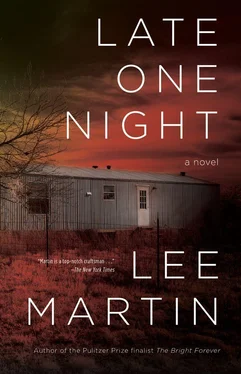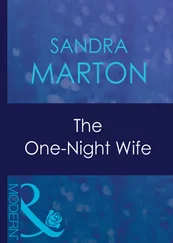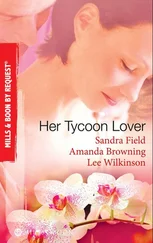“You’re a good friend,” Ronnie said. “You’re better than a million of me.”
He knew he didn’t deserve such goodness. He’d come out in the night to do a bad thing, but he’d spotted that hole in the trailer’s siding, and then Captain was there, and now as much as Ronnie was relieved, he was humbled and ashamed to be standing before this simple boy who, no matter what he was up to with those goats, was good of heart enough to know there were things a man should ignore, things too ugly to let out into the air. Captain was doing him that favor, leaving him to go back into town and to do his best to face the truth about himself. He was the kind of man who could burn out his wife and kids, and Captain was passing no judgment on him for that, was telling him that would be his and his alone to live with.
“You always treated me good,” Captain said. “You let me be your right-hand man.”
Ronnie couldn’t stop himself. He asked Captain why he’d come for the goats. “Why’d you take them?”
Captain’s voice, when he finally spoke, was tinged with just the slightest air of disbelief, as if he couldn’t imagine how Ronnie didn’t know. “They need a better place,” Captain said. “It’s a cold, cold night. They need a warmer place to be.”
That was enough to break Ronnie, the fact that Captain had come to do this favor. The wind was sweeping across the open fields. Overhead, the stars were brilliant in the clear sky. He wanted to put his arms around Captain. He wanted to thank him for being there on this night when he’d come to do harm. He wanted to press the boy to him and believe that people, even him, could be good.
But instead he said, “Guess we both need to get inside where it’s warm.”
Then he gathered up the Marathon can and made his way to his car. He was moving into the wind now, and he couldn’t hear Captain calling his name. He didn’t know that the boy had taken the box of Diamond matches from his jeans pocket, didn’t know that he’d pressed the head of a match against the strike strip, didn’t know that he’d flicked it with his finger — at that moment, the wind died down, and Ronnie felt the eerie calm after all the ruckus — didn’t see that match, perfectly lit, twirling in the dark.
“Look what I can do,” Captain said. “Look what you taught me.”
But Ronnie couldn’t make out the words. He was too far away.
Captain heard the Firebird come to life, not with a revving of the engine like Ronnie usually gave it, but with a low rumble of the exhaust pipes. The Firebird’s tires cracked through the thin ice at the shoulder of the blacktop as the car eased forward. Captain went to the end of the trailer in enough time to see Ronnie creeping up the blacktop, no headlights on, the white of the snow cover on each side of the road enough to guide him before he felt it was safe to turn on his headlights and make his way back into town.
“Ronnie,” Captain said, and he felt something warm his chest, something he had no words for — he only knew it had something to do with the way his mother had always made him believe that he was special, the Captain of the Universe. He only knew it had something to do with his father and Ronnie and Della and all the kids and Missy and Pat and, yes, even with Brandi Tate. Even the goats. All of them on this cold night.
Captain held that feeling inside him. He let it lead him home. He didn’t know that his legs had brushed through the dry grass or that his boots had tracked through the gas that had pooled up on the frozen ground. He didn’t think a thing about the match he’d lit and sent twirling toward the trailer. He didn’t know that the match had fallen onto the old chair, but later he’d know — the kind of knowing you know in your knower, nary a need for proof — that the lit match had twirled and dropped through the suddenly still night and fallen in a place where the first flame, such a small thing it must have been, caught hold, took in fuel and air and before long became something headstrong and wild, nothing anyone could hope to stop.
Biggs listened to the story of the match. Then he said, “Son, where did that gas come from?”
“There was a can sitting on the ground behind the trailer.”
“You didn’t tote it from your place like your daddy thought?”
“No, it was just there.”
Shooter said, “But you gave me cause to believe—”
Biggs interrupted him. He was growing impatient. “So you poured the gasoline around the trailer?”
Captain wouldn’t answer. He got interested in the scab on his hand, picking at the crust. Biggs knew he wouldn’t answer because he hadn’t thought his story all the way through. He didn’t have an answer because he hadn’t been the one to spread that gasoline.
“Son, if there was a can of gas back there,” Biggs said, “what happened to it?”
Shooter answered for him, “I guess it burned up in the fire.”
“Fire marshal deputies went through everything left over there.” Biggs shook his head. “No gas can. You know why, son?” Biggs waited for Captain to look at him, but he wouldn’t. “Because Ronnie took that can away with him, didn’t he? He was the one who poured that gas. Isn’t that so, son? He poured it, and then, if what you’re telling me is the truth, you lit it up.”
Captain’s voice was barely a whisper. “I didn’t mean to. I just wanted to show Ronnie what I could do with that match.”
“I didn’t know any of that,” Shooter said, his voice getting softer now. “I thought Wesley — you know — I thought — well, I wasn’t too far off from what I thought to be true. I couldn’t take a chance that you’d find out.”
“So you made up that story about Ronnie,” Biggs said, “and it turned out to be near enough true.”
Shooter’s voice was fierce now, pleading with Biggs. “Wouldn’t you have done it too? Tell me, wouldn’t you have done whatever it took to save your son?”
Biggs couldn’t say what he would have done had he stood in Shooter’s place, nor did he have an answer to the next question that Shooter asked.
“So tell me, Biggs, who’s to hold to account? My boy or Ronnie Black?”
That was the question that haunted the folks in Phillipsport and Goldengate all through the rest of winter. It was a question, really, that wouldn’t go away, not as long as there were folks alive who knew the story of Ronnie Black and his wife, Della, and how she and three of their children died late one night when their trailer caught on fire.
Caught on fire because a simpleminded boy loved a man who may have loved him back, but who, in the end, had no right to his devotion. Because the man made the boy feel special, and as a result the boy wanted to impress him with the trick he’d learned. Because the man went as far as to pour out that gasoline. Because the wind died down at the moment that lit match was twirling through the air. A trailer burned and four people died, and some said, well what do you expect from a boy like that , and some said, that poor boy, no mother and now this .
Laverne Ott said, “Wesley Rowe is God’s child. He may not always think the way you and I do, but I’ll tell you this, he knows what it is to love someone.”
Of course, there was the matter of what to do now that the facts were clear: a pissed-off man sloshing gasoline on a trailer with the intent of setting it on fire and then coming to his senses and walking away; a boy who meant no harm striking the match that started the blaze.
Spilled gasoline, a fancy match trick, a cold winter night.
“I never meant to hurt anyone,” Captain told Biggs. “Della was always good to me. I wanted to do something nice for her.”
Читать дальше












